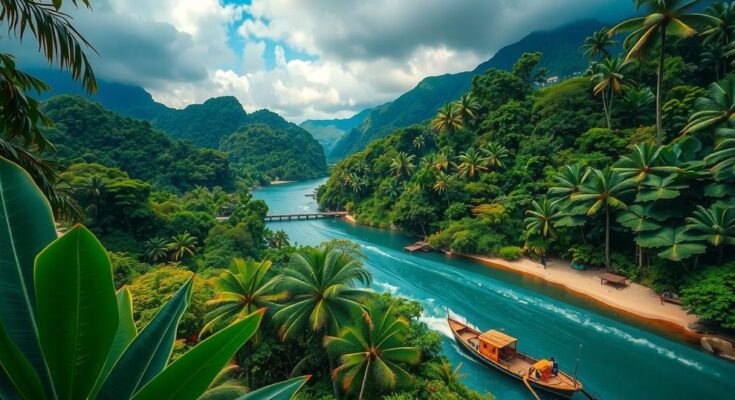Sarawak, Malaysia, is witnessing a surge in European tourism, with over 50,000 visitors in 2024, highlighting its unspoiled nature and rich cultural heritage. The state emphasizes eco-tourism and offers unique experiences through festivals, local cuisine, and indigenous traditions, aiming to promote and preserve its natural landscapes. Sarawak’s commitment to sustainability makes it a prime destination for travelers seeking adventure and authenticity.
Borneo’s Sarawak is emerging as a captivating destination, where unspoiled jungles meet vibrant cultures. This western Malaysian state is experiencing a remarkable influx of European travelers, with over 50,000 visitors from January to September 2024 alone, marking a 34% increase in long-haul tourism. Its pristine landscapes, rich cultural tapestry, and dedication to eco-tourism are drawing those seeking adventure and authenticity in their travels. Minister YB Dato Sri Abdul Karim Rahman Hamzah emphasizes the state’s diverse heritage, showcasing its 34 ethnic groups that contribute to a kaleidoscope of traditions, cuisines, and festivals. With two UNESCO World Heritage Sites, Gunung Mulu National Park and Niah National Park, adventurers can explore ancient rainforests and breathtaking cave systems, while food lovers can indulge in the celebrated ‘laksa,’ a dish made famous by the late Anthony Bourdain, as they stroll through the culinary-rich capital, Kuching. Sarawak’s appeal extends to its commitment to sustainability and eco-conscious travel. Initiatives like the ‘Sarawak, Malaysia, my second home’ program aim to preserve natural beauty while inviting visitors to engage in immersive experiences. Eco-tourists can enjoy activities such as kayaking and electric bike tours while knowing their contributions support local ecosystems and communities. Major events like the renowned Rainforest World Music Festival illustrate Sarawak’s dedication to cultural festivities; a portion of the ticket sales even funds mangrove replanting projects. Visitors have the chance to engage with indigenous cultures through homestays in traditional Iban Longhouses, especially during the Gawai Festival, a vibrant celebration of the rice harvest equivalent to Germany’s Oktoberfest. Ideal for exploration from April to October, Sarawak rewards travelers with numerous festivals that showcase its rich heritage and natural wonders, such as the Borneo Jazz Festival and Kuching International Marathon. The message is clear: Sarawak invites the world to marvel at its pristine landscapes and cultural heritage, ensuring every visitor leaves with a deeper appreciation for its treasures.
The article highlights the growing popularity of Sarawak, Malaysia as a prime eco-tourism destination. With its stunning natural landscapes, rich cultural diversity, and a focus on sustainability, Sarawak attracts a significant number of European tourists seeking unique experiences. The rise in tourism is attributed to the state’s unspoiled jungles, rivers, and commitment to preserving its cultural and natural heritage, encouraging visitors to immerse themselves in local traditions and nature conservation efforts. The mention of various festivals and culinary experiences encapsulates Sarawak’s vibrant culture, making it an appealing choice for travelers looking for more than just relaxation.
Sarawak is not just a destination; it is a vibrant tapestry of experiences waiting to be unraveled. From breathtaking landscapes and rich cultural heritage to a strong commitment to eco-tourism, this Malaysian state offers unique and immersive adventures. With a focus on sustainability and preserving its natural and cultural beauty, Sarawak invites travelers from around the world to explore, appreciate, and cherish its wonders. As tourism continues to grow, Sarawak stands ready to showcase its treasures, ensuring both visitors and the region benefit from this blossoming interest.
Original Source: www.euronews.com



